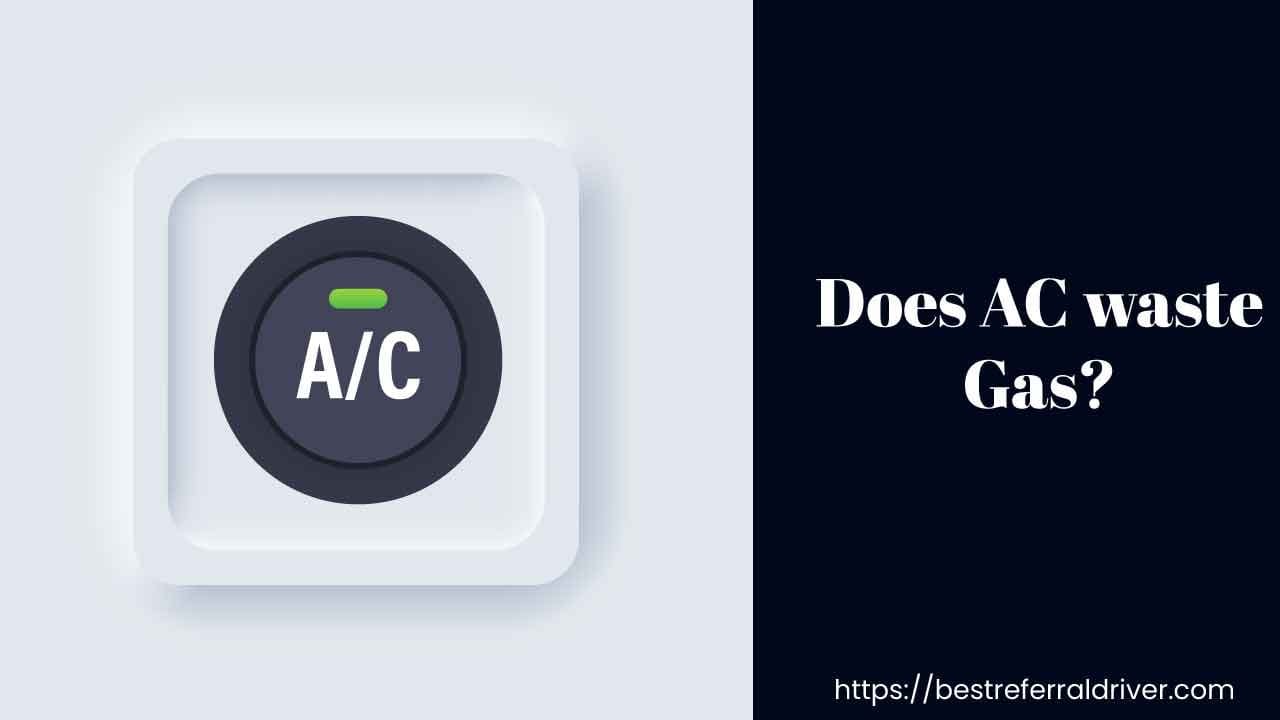Does AC Waste Gas? + Saving Tips



Does air conditioning (AC) have an effect on the amount of gas your car consumes? This is a question that many drivers are concerned about, whether they're rideshare drivers, delivery drivers, commuting to work or running errands. After all, with the rising cost of fuel, it's important to stay mindful of any habits or practices that will result in superior fuel efficiency. In this article, we'll take a closer look at AC and its effects on gas consumption, as well as provide useful tips for getting the most out of your car's gas tank.
QUICK ANSWER
Air conditioning can consume more gas than not running it, as it requires energy to power the A/C compressor. However, the difference is typically negligible unless you are driving at highway speeds with the windows down, which can lead to added air resistance and decreased fuel efficiency. Overall, using your car's air conditioning sparingly is recommended to save gas and improve fuel economy.
KEY SECTIONS
It is a common misconception that air conditioning systems in vehicles can waste gas. While it is true that using the air conditioning system does, in some way, impact fuel efficiency and performance, the idea that AC will drastically decrease gas mileage is simply false. Before we get into the specifics, let's take a look at how an air conditioning system works in a car.
The most basic component of an automotive air conditioning system is an evaporator. This component is located inside the passenger cabin and takes heat from the surrounding environment and moves it to the outside of the vehicle. The evaporator converts this heat to cool air which then circulates throughout the interior of the vehicle. This cool air helps keep passengers comfortable during hot summer days or long drives in warm climates.
In order for an AC system to work properly, it needs to be powered by a compressor which uses engine power to compress refrigerant, either Freon or R134a. When compressed, this refrigerant becomes hot, so it must be circulated through condenser coils and cooled before entering back into the cabin of the vehicle as cold air. This process requires additional energy from your engine, which can affect fuel efficiency in certain situations such as stop-and-go traffic or city driving.
However, modern automobile engines are designed with built-in systems that reduce this loss of power due to running your AC - these systems provide additional fuel when needed and allow better fuel economy while using your air conditioning system than when not running it at all. Additionally, there are many things you can do to improve your car's overall efficiency while running your AC - such as keeping up with regular oil changes and tune-ups, checking tire pressure regularly (including spare tires), and avoiding excessive idling when possible - all of which help reduce strain on your engine while running your AC system more efficiently than ever before!
Despite popular belief, most drivers don't actually experience significant drops in their cars' MPG (miles per gallon) when using their AC systems. In fact, studies have shown that most drivers only experience a decrease in their cars' MPG between 1-4% - much lower than what most people assume! This means that you probably won't see any drastic changes in gas mileage whether you're using your AC or not - but if you're really looking for higher MPG numbers then turning off your AC could make some difference over time.
On top of this small drop in MPG when using your car's AC systems, many newer vehicles come equipped with technologies like variable displacement compressors or electric variable valve timing (EVVTs) which further improve its efficiency while still providing effective cooling power! EVVTs allow for more precise control over engine speed and operation resulting in maximum efficiency while still providing sufficient cooling capacity for driver comfort during hot days on the road!
So, does AC burn gas? Based on research conducted it appears safe to say that contrary to popular belief - cars do not waste gas when their AC system is engaged! As long as proper maintenance protocols are followed and drivers practice smart driving habits such as avoiding unnecessary idling & revving up engines too quickly – there really shouldn’t be any significant decreases in MPG when utilizing one’s AC systems during hot summer months or lengthy drives enjoyed during warm climates!
👀 Related Article: Best gas apps to find cheap gas prices near you
Having a well-functioning air conditioner (AC) in your car is essential during those summer months when the heat can be unbearable. But, if you’re not careful, your AC can start to waste gas. This is due to two factors: increased drag on the engine from having to cool down the car cabin, and fuel evaporation from the AC condenser. Thankfully, there are some simple steps you can take to avoid wasting gas in your car.
To begin with, make sure your engine is tuned up properly. Your vehicle should be serviced regularly by a certified technician who will make sure all of its components are working optimally. If your car’s engine doesn’t run smoothly or it isn’t properly maintained, then it won’t be able to cope with the extra load of running the AC while driving; this leads to higher fuel consumption and more gas wasted.
It may also help to keep your car windows closed when running the AC; this will help keep warm air out and allow for more efficient cooling inside the cabin. Open windows make it harder for your AC system to maintain a comfortable temperature and can lead to shorter runs before shutting off; this causes more fuel consumption as the compressor has to cycle on and off more frequently than it would if all windows were closed.
You can also check whether or not there are any leaks in your air conditioning system which could be causing gas wastage—if left unchecked these leaks cause refrigerant gasses like R134a or R1234yf (which act as coolants) escape from their designated places within the system leading to inefficient cooling performance by increasing pressure within the evaporator coil; this decreases cooling capacity which means more energy is needed for each run of the compressor motor thus resulting in higher fuel consumption per hour of usage.
Finally, ensure that all filters and components within your vehicle's AC system are clean and undamaged—this improves airflow efficiency and prevents contamination from dust particles or other debris which could otherwise impede cooling performance and reduce energy efficiency leading once again to higher fuel costs over time due lack of proper maintenance over extended periods of use.
👀 Related Article: Best sunglasses for driving near you
The following are the best alternatives to air conditioning that will help you save money at the gas pump and get better gas mileage..
Portable fans are a great way to reduce fuel costs. They offer a great way to cool your car without the need for an AC system. Most are battery-powered, so you can take them with you wherever you go. Choose from desk fans, clip fans that attach to your dashboard or seat back, window fans, and floor/stand fans.
If you want to keep the sun out of your car while parked, sunshades are an effective option. They come in various sizes to fit any size car window and keep the heat out by reflecting the sunlight away from your vehicle.
Parking your car near a shade tree whenever possible is one of the way to keep car cool without ac, especially during the hot summer months. Also look for parking spots under buildings or other structures that offer natural shade throughout the day.
Before you start driving, open up all windows in your car to allow air flow and get some fresh air circulating inside the vehicle as quickly as possible before turning on the fan or AC system if necessary. This will also help cool down the interior of your car faster than if all windows were closed when starting off your trip.
Place ice packs or cold water bottles near vents on a hot day and turn on the fan to let cool air circulate through your vehicle's interior cabin space more quickly and efficiently than just relying on air conditioning alone.
Investing in a good quality car cover can help protect against UV rays and reduce heat absorption into metal surfaces; this will help keep temperatures inside your car lower during hot summer days while it is parked outside during long periods of time when running errands or at work all day long!
The best way to cool car without ac is to Use products such as ventilators and diffusers will help draw cooler air into your vehicle's interior cabin space from outside sources like open windows or even using ice packs placed near vents which will be blown into the vehicle's cabin when turned on; this is a great way to bring down temperatures without having an AC system installed in your car!
By following these tips, drivers can ensure they stay safe while taking advantage of their vehicles' air conditioning system during hot summer days without causing undue strain on their car or shortening its lifespan unnecessarily due to improper use of their AC system.
The first tip for driving with AC on is to make sure your car's fan speed is not set too high. If the fan speed is set too high, it can cause condensation to form on the windshield, resulting in poor visibility and potentially dangerous driving conditions. It's also important to adjust the temperature setting appropriately so that it matches the outside temperature. Setting the temperature too low or too high can cause your car's air conditioner to work harder than necessary and waste fuel.
Another important thing to keep in mind when driving with AC on is to make sure that your car has enough coolant fluid. Without adequate coolant fluid, your AC will not be able to effectively cool down the interior of your vehicle. If you suspect that your car may be running low on coolant fluid, you should have it checked immediately by a professional mechanic. Additionally, checking and replacing air filters regularly will ensure that your AC system runs efficiently and does not become clogged with dirt and debris.
It's also important to avoid turning off your car's air conditioner while driving as this can lead to excessive compressor wear and tear which will eventually result in costly repairs. If you do need or want to turn off the AC while driving, try opening up some windows instead as this will allow for some natural airflow inside the vehicle without causing any damage to the compressor unit. Other tips for managing your AC use include making sure all passengers open or close windows at the same time and avoiding sudden changes in temperature settings which can strain components of both manual and automatic climate control systems.
Finally, it's important to keep an eye out for any warning lights or sounds coming from your air conditioning system such as hissing noises or water leaks underneath the dashboard area which could indicate a problem requiring immediate attention from a certified mechanic.

Yes, a car heater does use gas. Gas is an integral part of the vehicle's heating system and is responsible for providing warmth in cold weather. Car heaters are powered by the combustion of gasoline or diesel fuel inside the engine, releasing hot air and exhaust gasses through the exhaust manifold. A small fan then draws this hot air into the cabin to warm occupants.
The amount of gas used to power a car heater will vary depending on its size and output; however, it can be considerable in some cases. Additionally, when running at full capacity for long periods of time, a car heater can consume large amounts of fuel and emit significant amounts of carbon monoxide and other pollutants.
Therefore, it's important to take these factors into consideration when using a car heater during cold weather to ensure that you're not wasting fuel unnecessarily or endangering yourself with dangerous emissions.
The difference between air conditioners and fans is a significant one. An air conditioner uses refrigeration to cool down the air in a room, while a fan mechanically moves the air around a room using rotating blades. Air conditioners are more effective at cooling down a space, as they reduce the temperature of the air itself, whereas fans just move around the existing warm air.
Fans also require less energy to run than an AC unit, making them more cost effective and energy efficient. Additionally, fans are portable, making them ideal for spot cooling or moving from room to room when needed, while AC units need to be installed in windows or walls and can't be moved easily. Depending on the size of your space and cooling needs, either an AC system or fan could work best for you.
The answer to the question of whether cruise control uses more gas or not depends largely on how and where you use it. Generally, driving at a steady speed with cruise control can help you save fuel as it eliminates any wasteful acceleration. However, if you are driving downhill and don't adjust your speed manually, there is a chance that the car may accelerate beyond its set speed, leading to an increased fuel consumption rate. In any case, research suggests that using cruise control over long distances helps reduce fuel consumption by up to 20%.
Another factor which determines how much fuel your car will consume when using cruise control is the terrain and road conditions. On a flat surface with minimal turns or elevation changes, cruise control can work wonders in terms of fuel economy. However, if you are traveling on hilly roads or highways with frequent curves and turns, then manual adjustment of the vehicle's speed would be necessary to maintain optimum levels of efficiency.
Finally, another element which contributes to higher fuel consumption while using cruise control is the type of vehicle being driven. For instance, cars equipped with powerful engines tend to burn more fuel than lighter vehicles operating at similar speeds. The same goes for cars loaded with heavy luggage or pulled along by trailers - as they require more power from the engine under any given condition. All these factors must be taken into account when evaluating whether cruising with your car will result in better gas mileage or not.
Now you know that the air conditioning consumes fuel and makes the engine less bright, you understood how much it affects total consumption and you got some other gas saving tips. If you are a rideshare driver with a high fuel consumption car, we suggest you consult our rideshare rental guide.
We provide the best resources and information for the major ridesharing, bike sharing, kids sharing and delivery companies. Best UberEats Invite Code, Lyft driver Promo code and Postmates Referral code. Sign up at 100% working and they will give you the best sign up bonus at any given time.
Get up to $50 in Lyft Credit with our coupon code
LYFT Rider promotion
Get up to $10 off on your first Uber Eats order
Uber Eats Promo Code